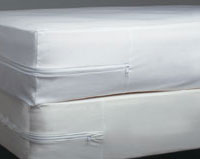Allergist Interview: Dr. Jeffrey Lehr on Being an Allergy Relief Detective and Coach
 This month, we spoke with allergist Dr. Jeffrey Lehr, who practices in Monterey, CA. Here are two quotations that let you know how his patients feel about their experiences with Dr. Lehr: “All I can say is that I have never had the quality of life that I am currently living. Some people go to a general physician to treat allergies, but why not go to the expert”, and “He’s very knowledgeable and sympathetic. He really wants to help and will exhaust all avenues in doing so.”Indeed, Dr. Lehr describes himself as an allergy detective and coach. Read some of his great advice below–straight from the allergy expert to you.
This month, we spoke with allergist Dr. Jeffrey Lehr, who practices in Monterey, CA. Here are two quotations that let you know how his patients feel about their experiences with Dr. Lehr: “All I can say is that I have never had the quality of life that I am currently living. Some people go to a general physician to treat allergies, but why not go to the expert”, and “He’s very knowledgeable and sympathetic. He really wants to help and will exhaust all avenues in doing so.”Indeed, Dr. Lehr describes himself as an allergy detective and coach. Read some of his great advice below–straight from the allergy expert to you.
Please tell me a little bit about yourself and your history as an allergist.
“I was a young married guy in New York City and I wanted a career where I could still live life and enjoy balance. Allergy and immunology was a relatively new specialty when I got into it, about forty years ago. There were a bunch of new procedures emerging, so the field was quite exciting. I was an allergen specialist in Dayton, Ohio at the Patterson Air Force Base. Then we moved to Monterey, CA, where we’ve been for 37 years.”
How big is your practice? Is there a particular type of allergy or treatment your practice specializes in?
“We treat general allergies of all kinds in both children and adults, so we treat the usual symptoms like sneezing, coughing, itching, wheezing, and the like, as well as asthma.”
What do you love about your job?
“I love the fact that I’m a detective every day. Every allergy patient has a different variation of a problem and solving their particular situation is like being in a detective story. I like that I’m able to get to the bottom of their problem and treat it with environmental control, medications, and possibly shots.”
If you could suggest one thing for your patients what would it be?
“Basically, listen to the coach, the doctor, and try environmental control first. The primary thing is to get rid of, or lower, the things that trigger the problem. Next, I help my patients find out which assortment of medications makes them feel better rather than worse. There’s a downside to some medications, like drowsiness or other local or systemic reactions.”
What is your favorite allergy relief product?
 “When a patient listens and actually follows through, environmental control is the best thing. You folks at AchooAllergy.com have so many products that help with this, like bedding encasings. and other products to keep carpets less dusty, such as high quality vacuum cleaners and powders. Small items like pet wipes and larger items like air cleaners are also great allergy relief products.
“When a patient listens and actually follows through, environmental control is the best thing. You folks at AchooAllergy.com have so many products that help with this, like bedding encasings. and other products to keep carpets less dusty, such as high quality vacuum cleaners and powders. Small items like pet wipes and larger items like air cleaners are also great allergy relief products.
“Medications also have their place. Antihistamines, especially new over-the-counter versions, are improving, too. Specifically, they have fewer side effects such as sleepiness, which is particularly important when you need to study or drive, for example. Other potential problems with medications include drying and possibly urine and bowel problems. Nasal sprays can cause nasal irritation or bleeding.”
Where do you see allergy treatment going in the near future? In the distant future?
“I see medications continuing to improve. I also see better programs with shots, or immunotherapy. I think there will be a change in allergen shots that will enable protection against an allergen without as much risk of a reaction. This involves using a slightly different protein structure of the allergen.
“Sublingual immunotherapy (SLIT) is also something I see happening here in the United States; they already have it in Europe. We can use SLIT here for allergy treatment, but it’s not covered by insurance, so it isn’t an option for as many allergy sufferers.
“Right now, SLIT is mostly used for single major allergies. I think this will change too. SLIT is so convenient: Patients can administer the therapy themselves, at home. SLIT is especially helpful for patients who don’t want the inconvenience of having to take avoidance measures or use medications. Children, also, would rather not come in to the doctor’s office so often or receive so many shots, as with standard immunotherapy treatment.
“SLIT is also a great solution for those who find themselves in allergy-triggering situations where they can’t control the environment, for instance, visiting a family member who has pets. But because of insurance not covering it, SLIT is a financial burden on the family.
“So hopefully SLIT will eventually be approved by the FDA so it is covered by insurance and therefore available to more individuals. I think it will also eventually be able to effectively treat not only for one allergen at a time, but multiple allergies.
“I also see depo shots for allergy treatment improving. Depo shots involve a deposit of the allergen staying inside the patient’s body; this way, the body continues to make antibodies.”
Is there anything else you’d like to add or discuss?
“Patients really need to be motivated to listen to their allergists’ recommendations and do their homework. This includes being willing to adjust their medications, implement environmental control, and maybe get allergy shots. Allergy patients can get a lot of relief if they do their homework and listen to the doctor. Being an allergist is a coach thing. And the patient isn’t going to win the game if they aren’t listening and trying what the doctor suggests.”
